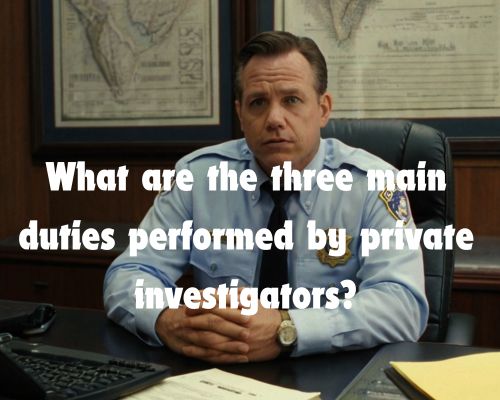What are the Three Main Duties of Private Investigators?

What are the Three Main Duties of Private Investigators?
“Private investigators are professionals who are hired to conduct investigations and gather information for a variety of purposes. These purposes can range from legal proceedings to personal matters.” said Charles Jimerson of Private Investigator West Palm.

Private investigators are often called upon to perform a variety of tasks, but there are three main duties that they typically perform.
The first duty of a private investigator is to gather information. This includes conducting research, collecting data, and analyzing evidence.
Private investigators must be skilled at gathering information from a variety of sources, including public records, social media, and interviews with witnesses. They must also be able to analyze the information they gather to form coherent reports that can be presented to clients.
The second duty of a private investigator is to conduct surveillance. This involves observing and monitoring people or places to gather information.
Private investigators may use a variety of tools and techniques to conduct surveillance, including cameras, binoculars, and GPS tracking devices. They must also be able to document their observations in a clear and concise manner, as this information may be used in legal proceedings.
Core Responsibilities of Private Investigators
Private investigators play a crucial role in the criminal justice system and businesses by conducting investigations, gathering information, and providing valuable insights to clients.
Their core responsibilities include conducting surveillance and gathering evidence, performing background checks and research, and interviewing individuals and providing testimony.
Conducting Surveillance and Gathering Evidence
One of the primary responsibilities of private investigators is to conduct surveillance and gather evidence.
This involves using various techniques such as video cameras, photography, observation, and binoculars to observe and document individuals or activities of interest.
Private investigators must also stay up to date with the latest technology to effectively carry out their duties. They must be skilled at collecting and analyzing evidence, and presenting their findings in a clear and concise manner.
Performing Background Checks and Research
Another important responsibility of private investigators is to perform background checks and research.
This involves investigating criminal records, public records, family history, education, and employment history.
Private investigators use computer databases and other sources to gather information and provide clients with a comprehensive report. This information can be used by businesses to make informed hiring decisions or by individuals to make important personal decisions.
Interviewing Individuals and Providing Testimony
Private investigators also interview individuals and provide testimony in legal proceedings.
They must have excellent communication skills and be able to gather information from witnesses and other individuals involved in a case. They must also have discretion and be able to maintain confidentiality when necessary.
Private investigators may be called upon to provide testimony in court proceedings, and must be knowledgeable about legal issues and procedures.
Qualifications and Skills for Effective Investigation
Private investigation requires a combination of education, training, and experience. To become an effective private investigator just like Private Investigator West Palm, you need to have a set of skills and qualifications that will enable you to carry out your duties effectively. Here are some essential qualifications and skills that you need to possess:
Education and Certification Requirements
To become a private investigator, you need to have a high school diploma or equivalent.
A bachelor’s degree in criminal justice or political science can also be an advantage. You can also pursue certification programs that are offered by various professional organizations such as the National Association of Legal Investigators and ASIS International.
Essential Investigative Skills
Private investigation requires a set of skills that are essential for conducting investigations effectively.
These skills include being detail-oriented, logical, observant, patient, and discreet. You need to be able to communicate effectively and have excellent organizational skills. You should also have knowledge of the law, legal regulations, and privacy laws.
Legal Knowledge and Compliance
Private investigators must have a thorough understanding of the law and legal regulations that govern their work. They must also comply with the privacy laws and obtain the necessary licenses to operate legally. Additionally, private investigators must have a clean criminal record.
To become an effective private investigator, you need to have a combination of education, training, and experience. You should possess essential skills such as being detail-oriented, logical, observant, patient, and discreet. You must also have a thorough understanding of the law and legal regulations that govern your work. Additionally, you should comply with the privacy laws and obtain the necessary licenses to operate legally.

